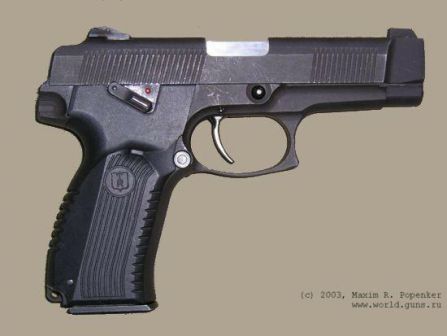Yarygin PYa pistol, left side
Yarygin PYa pistol, right side; note ambidextrous safety in the "ready to fire" position
Yarygin PYa pistol, with the slide locked open
Type: Double Action
Caliber: 9x19 mm 7N21 (9mm Luger/Para)
Weight unloaded: 950 g (with empty magazine)
Length: 198 mm
Barrel length: 112 mm
Capacity: 17 rounds
The PYa (Pistolet Yarygina - Yarygin pistol) was developed for the
Russian Army trials, codenamed "Grach" (rook). These trials were started
by issuing initial requirements for a new military pistol in 1993. Than
new pistol should had have a DA trigger, large capacity magazine, all
steel construction and be able to be converted into 9x18 PM and PMM,
9x19mm Luger, and 7.62x25mm TT chamberings. Later on, the multicaliber
option was dropped from military requirements, and in the late 1990s
Russian army settled on the improved version of the worlds' most popular
9mm Luger/Parabellum round, very hot loaded (peak pressure generated by
7N21 is well beyond 9mm +P standards) and fitted with armour piercing
bullet with hardened steel core. Several designs were submitted to the
trials, but eventual winner was the pistol, designed at the state
Izhevsk Mechanical Plant by the Vladimir Yarygin. This pistol, initially
known as the 6P35 (military index during trials) or as MP-443 "Grach"
(manufacturer's designation), now is officially adopted by the Russian
Government for Military and Law Enforcement use under the PYa
designation, and already issued to some Russian Army units, most
probably located in Chechnya.
In those ages of lightweight alloys and plastics, and complicated
trigger systems, the all steel DA pistol may look little outdated and
conservative, but, in my opinion, there's nothing wrong with the
conservative approach, especially if it the result is well balanced and
fits the intended niche well, which PYa does. I had the chance to
examine the production pistol, as well as to see it in action (during
Russian Law Enforcement IPSC competition, held in September, 2003, near
the St.Petersburg). For me, PYa appeared as a well balanced, sturdy
pistol with adequate accuracy and decent firepower. The only things that
could be improved, in my opinion, are the fixed sights, and the shape
of the polymer grip panels, that felt too angular in my palm.
The PYa is a short recoil operated, locked breech pistol. It uses a
modified Browning "High Power"-style locking, with the cammed slot under
the barrel, that is used to lock and unlock the single lug on the
barrel with the ejection window in the slide. The slide and frame are
made from carbon steel, the barrel is made from stainless steel. The
conventional DA trigger features an ambidextrous manual safety on the
frame, that could lock the hammer either in lowered or in cocked
position, allowing for "cocked and locked" mode carry. There's no
decocker, and additional automated safety is built into the system, that
locks the firing pin when trigger is not pressed. The external hammer
on production pistols is partially enclosed from the sides by the slide
extensions, to facilitate snag-proof handling. Front sight is machined
with the slide, rear sight is dovetailed into the same. Both sights
featured white non-luminous inserts (tritium-filled "night" sights
available as option). Wrap-around grip panels are made from polymer, and
the grip is provided with the lanyard ring. Button-operated magazine
release is located at the base of the triggerguard, and can be mounted
on either side of the frame, depending on the user preferences (easily
re-installed by the user itself in a minute). Dual stack magazines are
made from steel and hold 17 rounds of 9x19mm ammunition, plus one in
chamber. There's also some information that a 18-rounds magazine will be
introduced for PYa in 2004.



Tidak ada komentar:
Posting Komentar